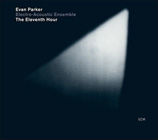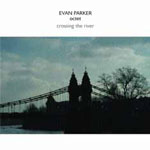Home » Jazz Articles » Multiple Reviews » Evan Parker: The Topography of the Lungs Evan Parker, An...
Evan Parker: The Topography of the Lungs Evan Parker, Antwerp 1988, The Eleventh Hour & Crossing the River
 |  |  |  |
Evan Parker The Topography of the Lungs Incus-Psi 2006 | Fast Colour Antwerp 1988 Loose Torque 2005 | Evan Parker Electro-Acoustic Ensemble The Eleventh Hour ECM 2005 | Evan Parker Crossing the River Psi 2006 |
At the beginning of his recording career, saxophonist Evan Parker oscillated between brutally energetic albums by continental Europeans (Peter Brötzmann, Manfred Schoof) and reserved, almost minimalist, discs from his native England (Tony Oxley, Music Improvisation Company). In a cover story from this gazette in 2003, Parker said, "Having dealt with those two extremes was a good early training or early experience for me to know that an essential part of an improviser's arsenal is flexibility.
Shortly after the aforementioned early appearances, Parker made his first record as a "leader , in tandem with guitarist Derek Bailey and drummer Han Bennink. The Topography of the Lungs set up an introspective template for a slice of British improv still being investigated (the British scene had always been one of circles, ones that overlapped but independently produced very different music from each other). It was also the first release of Incus Records, a cooperative label run by Parker, Bailey and drummer Tony Oxley, which followed the model of an artist-conceptualized and -run imprint initiated by ICP in Holland and FMP in Germany. Control of Incus was eventually ceded to Bailey and Topography did not figure into the reissue plans of Parker's Psi label until after the guitarist's death last year. While this trio had recorded together before on Brötzmann's Machine Gun and Nipples and Schoof's European Echoes (and Bailey and Bennink had made a duo the year before on ICP), Topography revels slightly more in space and silence. Unlike Oxley's albums with Parker and Bailey that were explorations of texture, almost daring the players to keep quiet, Bennink's presence results in something more primal that Parker and Bailey can't help but follow at times. But in a small group without a bassist, the music switches between racket and reserve more smoothly and many future aspects of the three musicians are already evident. What sets Topography apart from other albums of the period is how much it seems thought out. It probably wasn't in any substantive way but its improvisations, even across the longer tracks, are more cohesive than much of what followed in improvised music. The disc, as a bonus, adds two relatively brief pieces not previously issued to the original program of four.
Moving forward 18 years is a newly issued concert recording that ranks as one of Parker's odder discographical entries, along with his two appearances with the Brotherhood of Breath and one with Charlie Watts' Orchestra. Fast Colour, the first disc on bassist Nick Stephens' vanity label, was a live tribute to bassist Johnny Dyani, who had passed two years prior. Alongside Parker is drummer John Stevens (a frequent early collaborator with Parker and late one with Stephens), Stephens himself, saxophonist Dudu Pukwana (one of the main forces of the Brotherhood), trumpeter Harry Beckett, trombonist/vocalist Annie Whitehead and vocalist Pinise Saul. After being a member of the seminal Blue Notes and playing in the Brotherhood, Dyani spent his career in Scandinavia exploring his South African roots and Fast Colour reflects this aesthetic. Stevens spends most of the album playing an exultant swing (he penned all the material) and the horn lines weave around jubilant melodies, anchored by Stephens' gooey bass. The highpoint of this disc is not necessarily anyone's individual contributions but hearing how giants like Pukwana, Parker and Beckett fuse together, Parker in particular more celebratory than cerebral, but still always recognizable. Dyani was a magnificent spirit and Fast Colour is an effective tribute.
The last two entries into this review reflect the modern Evan Parker. As he has gotten older, Parker has continued his diversity: fiery collaborations in trio with pianist Alex Von Schlippenbach, elegant statements with September Winds, manufactured duos with birdsongs. One of his more ambitious recent projects has been his Electro-Acoustic Ensemble, an extension of his work with the Music Improvisation Company and duo with percussionist Paul Lytton and related to a 1993 effort with Ghost-in-the-Machine and recent appearances with Spring Heel Jack. The world of electronic music is often not about individuals but creating a soundscape seemingly larger (or sometimes smaller) than the musicians involved. On the group's fourth album, The Eleventh Hour, Parker, Lytton, violinist Phillip Wachsmann, pianist Augusti Fernandez and bassist Adam Linson (instead of the usual Barry Guy) are matched against six people operating an array of signal processors, keyboards and electronics. This is the largest version of the group but most of the players have remained stable so what was initially Parker's concept has now been developed organically by the whole, whatever disconnect there may be between acoustic and electronic components expertly fused. And because of this fusion, listeners cannot try to grasp at comfortable straws. Not jazz, not electronica, certainly nothing resembling traditionally linear or hierarchical forms, the Electro-Acoustic Ensemble is extremely difficult listening, even for ardent fans of Parker's other work. Precisely because it sounds like so little of what Parker might be 'known for', it forces a reevaluation of his musical contributions in an environment more truly egoless than most improvised music purports to be.
Parker's most recent album for his Psi label, Crossing the River, is an all acoustic, all improvised octet session, bringing together various musicians Parker has worked with over the years: Fernandez, Wachsmann, bassist John Edwards, guitarist John Russell, flutist Neil Metcalfe, cellist Marcio Mattos and clarinetist John Rangecroft. With no drums and instruments tending towards the higher tonal range, the feel is a classical one, albeit with many rampant moments. The album is broken up into 8 pieces, beginning and ending with the full octet. In the middle is a quintet, three trios - sax, bass and guitar; violin, cello and piano; clarinet, bass and guitar - and a piano/flute duet. The fact that Parker does not play on all pieces is illuminating. Though he might have convened the group and released the recording, it is not about him leading a group. It is in many ways the current culmination of lessons learned from albums that preceded it; how groups of musicians interact within freedom and how different scenarios can yield fruitful results, something Parker is eminently qualified to scrutinize.
Tracks and Personnel
The Topography of the Lungs
Tracks: Titan Moon; For Peter B & Peter K; Fixed Elsewhere; Dogmeat; Found Elsewhere 1; Found Elsewhere 2.
Personnel: Evan Parker: saxophones; Derek Bailey: guitar; Han Bennink: percussion.
Antwerp 1988
Tracks: Now Time; Way It Goes; John Dyani's Gone; Mbizo; Way It Goes/Now Time.
Personnel: John Stevens: drums/leader; Harry Beckett: trumpet; Evan Parker: tenor saxophone; Dudu Pukwana: alto/soprano saxophones; Pinise Saul: vocals; Nick Stephens: double bass; Annie Whitehead: trombone/vocals.
The Eleventh Hour
Tracks: Shadow Play; The Eleventh Hour, Parts 1-5.
Personnel: Evan Parker: soprano saxophone, voice; Philipp Wachsmann: violin, live electronics; Paul Lytton: percussion, live electronics; Agusti Fernandez: piano, prepared piano; Adam Linson: double bass; Lawrence Casserley: signal processing instrument, percussion, voice; Joel Ryan: sample and signal processing; Walter Prati: computer processing; Richard Barrett: sampling keyboard, live electronics; Paul Obermayer: sampling keyboard, live electronics; Marco Vecchi: sound projection.
Crossing the River
Tracks: Octet I; Quintet; Trio I; Trio 2; Trio 3; Duo; Octet 2; Octet 3.
Personnel: Neil Metcalfe: flute; John Rangecroft: clarinet; Evan Parker: tenor saxophone; Philipp Wachsmann: violin; Marcio Mattos: cello; John Edwards: bass; John Russell: guitar; Agusti Fernandez: piano.
< Previous
Brad Mehldau: House On Hill & Metheny...
Next >
Leaving for Home
Comments
About Evan Parker
Instrument: Saxophone, soprano
Related Articles | Concerts | Albums | Photos | Similar ToTags
For the Love of Jazz
 All About Jazz has been a pillar of jazz since 1995, championing it as an art form and, more importantly, supporting the musicians who create it. Our enduring commitment has made "AAJ" one of the most culturally important websites of its kind, read by hundreds of thousands of fans, musicians and industry figures every month.
All About Jazz has been a pillar of jazz since 1995, championing it as an art form and, more importantly, supporting the musicians who create it. Our enduring commitment has made "AAJ" one of the most culturally important websites of its kind, read by hundreds of thousands of fans, musicians and industry figures every month.




















